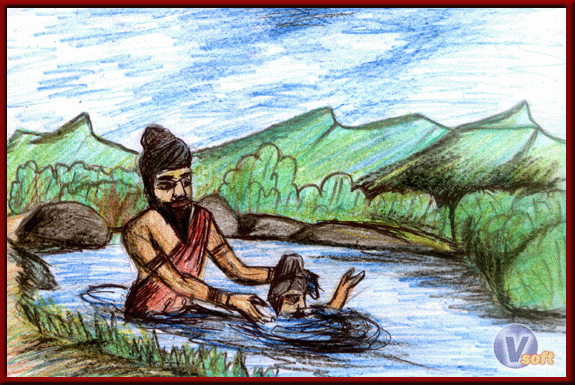127. The Bodhisatta And His Cunning Brother

Once upon a time when Brahmdatta was reigning in Benares. The Bodhisatta was born in a merchant’s family worth eight crores. When he grew up, at his parents’ death he provided for his younger brother and carried on the house: he made an alms-chamber at the house-door and lived as a householder giving much in alms. One son was born to him; and when the son could walk on his feet, he saw the misery of desires and the blessing of renunciation, so handing over all his wealth together with his wife and child to his younger brother, he became an ascetic, and gaining the Faculties and Attainments he dwelt in the Himalaya.
The younger brother took that one son: but seeing him grow up he thought, “If my brother’s son lives, the estate will be divided into two parts, I will kill my brother’s son.” So one day, sinking him in a river, he killed him. After he had bathed and come home, his brother’s wife asked him, “Where is my boy?” “He was bathing in the river; I looked for him but could not see him.” She wept and said nothing. The Bodhisatta, knowing of this matter, thought, “I will make this business public;” and so going through the air reached the door of his house. Not seeing the alms-chamber, he thought, “That wicked man has destroyed the chamber.” The younger brother, hearing of his coming, came and saluted the Bodhisatta and taking him up to the roof gave him good food to eat. And when the meal was over, seated for friendly talk he said, “My son does not appear: where is he?” “Dead, my lord.” “In what way?” “At a bathing place; but I do not know the exact way.” “Not know, thou wicked man! your deed was known to me; did you not kill him in that way? Will you be able to keep that wealth when destroyed by kings and others? What difference is there between you and the Mayha bird?” The Bodhisatta spoke:–
There is a bird called Mayhake, in mountain cave it lives:
On pipl trees with ripening fruit, ‘mine,’ ‘mine’ the cry it gives.
The other birds, while thus he plains, in flocks about him fly:
They eat the fruit, but still goes on the Mayha’s plaintive cry.
And even so a single man enormous wealth may win,
And yet may not divide it fair between himself and kin.
Not once enjoyment does, he reap, of raiment or of food,
Of perfumes or of garlands gay; nor does his kinsfolk good.
‘Mine, mine,’ he whimpers as he guards his treasures greedily:
But kings, or robbers, or his heirs that wish to see him die
Pillage his wealth: yet still goes on the miser’s plaintive cry.
A wise min, gaining riches great, is helpful to his kin:
It is thus he will win repute on earth and heaven hereafter win.
So the Great Being made his brother arrested and punished. He renewed the alms-giving, and going to the Himalaya pursued meditation without interruption and so went to the Brahmaloka heaven.
After the lesson, the Master said, “So, great king, the stranger merchant had neither son nor daughter for all that time because he killed his brother’s son,” and then he identified the Birth: “The younger brother was the stranger merchant, the elder was myself.”


Leave a Reply